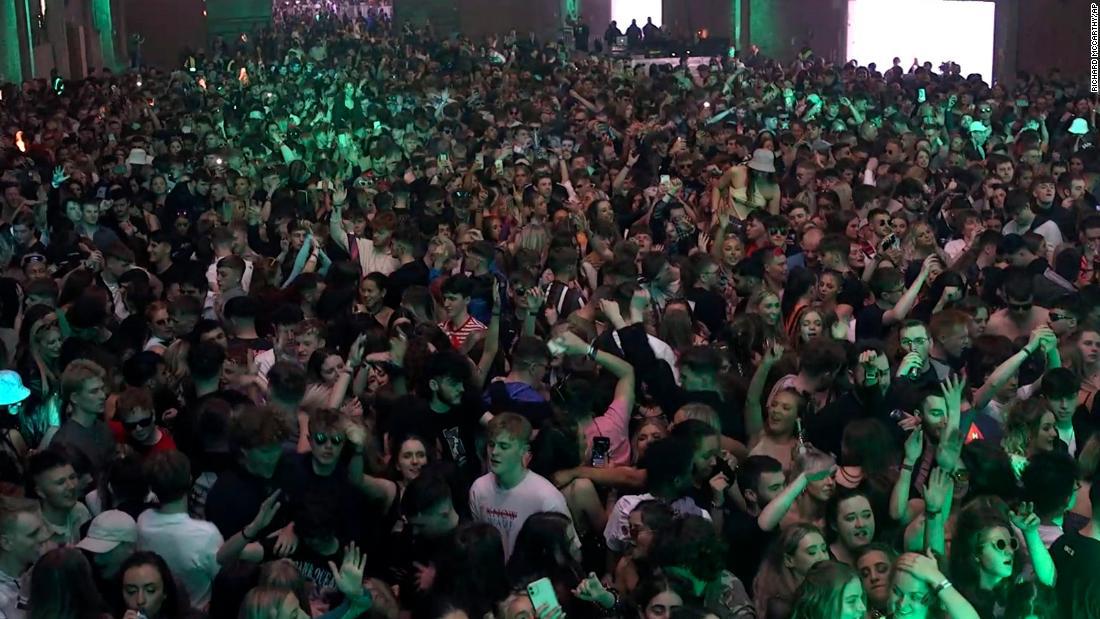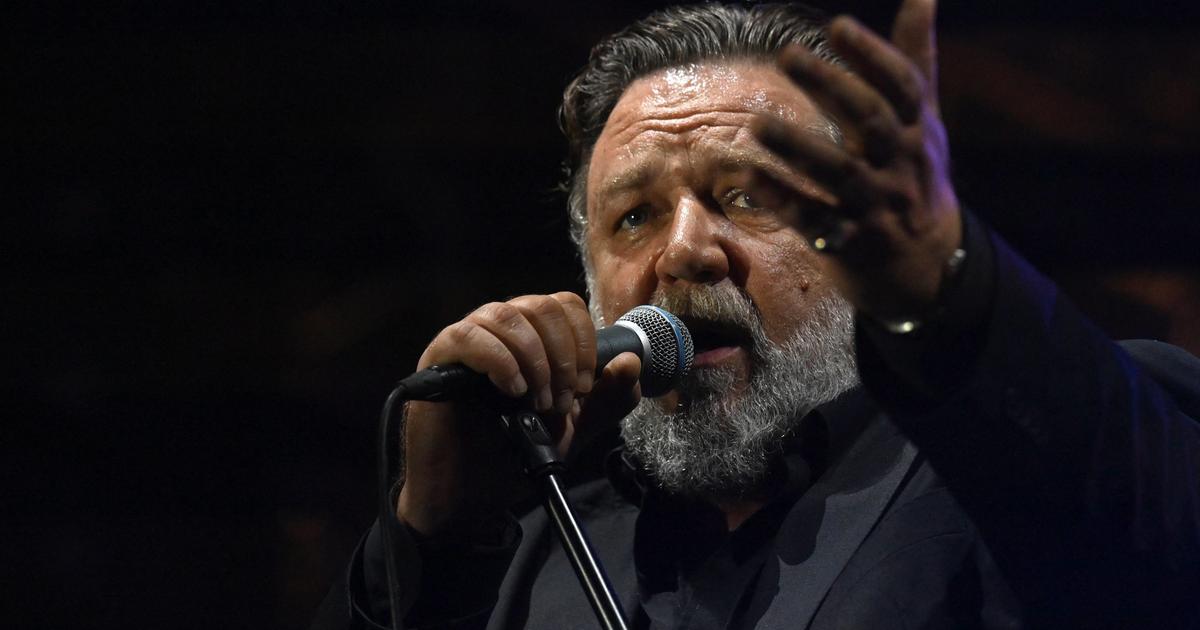Dr. Fauci warns about the variant delta 2:37
(CNN) -
Employees go back to the office, kids go to summer camp.
The post-pandemic daily routine may soon look like 2019, but what about the sheer joy of singing alongside a favorite artist, crammed into a sea of thousands of fans?
When will live music return?
A sunset concert Tuesday night at the Red Rocks Amphitheater in Colorado was a welcome sight for many music lovers, including event attendee Melinda Murphy, a teacher from Denver.
Murphy told CNN that if that same concert had been indoors, he might not have attended.
The idea of being in a crowd indoors "still scares me a little ... enclosed spaces are too tight for me," he said.
To attend a large indoor live music event, Murphy said she would need to know the venue's capacity and physical distancing plans before attending, and that she would wear a mask despite being fully vaccinated.
"I don't think everyone who goes around in public without a mask is fully vaccinated," he told CNN as music played in the background.
The revision of the US Centers for Disease Control and Prevention (CDC) guidelines, which allow fully vaccinated people to go without a mask indoors and outdoors, has stimulated the desire and ability to return to normality, and to concerts.
advertising
"We have a huge pent-up demand for concerts globally," Joe Berchtold, president of Live Nation, one of the world's largest entertainment companies, told CNN's Julia Chatterley on Tuesday.
However, the most recent data from the Axios-Ipsos coronavirus tracking index reveals that 37% of adults consider attending a concert indoors to be a high risk, 48% rate it as small to moderate risk and 14% say they do not pose any risk.
So what is the real risk of indoor concerts?
Large indoor events after covid-19
Indoor sports leagues like the NBA have recently increased their attendance capacity, but concerts create a different set of circumstances.
Following an outbreak of COVID-19 in an Australian church, researchers blamed it on poor ventilation, the contagion capacity of the first patient and a greater ability to spread the virus driven by the act of singing.
"Singing has been shown to generate more respiratory droplets and aerosol particles than talking," the researchers wrote in a report published in the CDC's Morbidity and Mortality Weekly Report.
Aerosols are a form of contagion of the covid-19 virus 2:04
"There are few places that are less conducive to a pandemic than a live concert with thousands of fans singing at once."
After months of physical distancing, covid-19 restrictions and shutdowns, some scientists decided that the best way to understand how the coronavirus could spread in large crowds indoors would be to study just that.
There are more and more scientific publications that show that, with the appropriate covid-19 mitigation measures, large concerts in closed venues can be carried out safely.
However, some scientists, including those conducting the studies, have reservations about the breadth to which these results can be applied.
A study conducted with 1,000 people at a live music event in Barcelona last December concluded that the concert did not cause any case of contagion of covid-19, according to a recent publication in the Lancet Infectious Diseases magazine.
Attendees had to undergo covid-19 tests before entering, and had to wear N95 masks the entire time, but were able to sing and dance without distancing themselves during live performances.
The venue improved ventilation and implemented crowd management and control, and participants had to use two smartphone apps to track contacts and communicate test results after the event.
However, the study's lead author, Dr. Josep Llibre, from the Germans Trias i Pujol University Hospital in Barcelona, said the study results should be taken in context.
“It is important that our findings are considered in light of the situation in Spain at that time, when the cases were not high and there were many restrictions.
As a result, our study does not necessarily mean that all mass events are safe, "he said.
The trial took place on December 12, 2020, before the widespread transmission of covid-19 variants and vaccines.
Llibre says more research is needed on large live indoor events because the results, he believes, would be different depending on the prevalence of the virus in a community.
'Widespread vaccination campaigns, changes in local incidence and the emergence of variants of SARS-CoV-2 with higher transmissibility could affect the interventions we test, so we need more studies that include more people exploring different scenarios and policies that consider the local context, ”added Llibre.
The results of the Barcelona study could serve as a model for events in countries with lower vaccination rates and with current mask requirements, but for highly vaccinated countries that are in the process of reducing covid-19 requirements, the more likely, the results are no longer applicable.
For a maskless live gig model that includes a partially vaccinated population, look no further than the UK.
In April and May 2021, the UK government sponsored a series of nine large multi-day live events, known as the Event Research Program (ERP).
Its aim is to support the British government's 'roadmap' for post-covid-19 recovery.
They experiment with festivals and concerts in the Netherlands 1:19
"The roadmap outlines plans to explore when and how events with large crowds, with less physical distancing or in environments where transmission risk is high without mitigation, can become safe again," according to the website. of the UK government ERP.
One of the ERP events in Liverpool was in a closed nightclub that was attended by between 3,000 and 4,000 local people for two nights. Participants had to undergo a covid-19 test before entering, but did not have to wear a mask or physical distance during the event. Additionally, attendees were asked to undergo a second COVID-19 test five days later. Researchers tracked all positive cases and monitored nearby communities for any spike in Covid-19 cases.
According to the University of Liverpool, nine COVID-19 cases related to the nightclub trial were identified, although it is not entirely clear that these infections occurred at the concert, and 'the results showed that there was no evidence of any spread of the virus around the pilot events. '
Professor Iain Buchan, Executive Dean of the University of Liverpool Institute of Population Health and responsible for the event at the Liverpool nightclub, told CNN that large indoor events should continue to require covid-19 testing if the public's vaccination status is unknown.
“Large events, especially if held indoors and without social distancing or mask-free use, should be treated as potential outbreaks and have all reasonable testing and other risk mitigation measures ... until such time as rates of infection are low enough, and concerns about variants are within reasonable limits.
The Liverpool events took place at a time of low overall risk.
Testing is an important part of risk mitigation, "Buchan told CNN in an email.
The Director General of Health of the United States warns that unvaccinated people are at risk of contracting a potentially more dangerous variant of covid-19
Erin Bromage, associate professor of biology at the University of Massachusetts Dartmouth, created the covid-19 safety plan for the Academy Awards live, and has often been a consultant on how to hold large events safely.
He agrees that testing is essential for the safety of large crowds that congregate indoors while the virus is still present in the community.
"If it was a live event indoors, it would incorporate rapid antigen tests, those cheap tests that cost $ 5. It would incorporate them into the price of admission and have people take them on entry," he said. Bromage during a telephone interview from a film set where she was a covid-19 consultant.
But Bromage does not believe the protocols have been adequately tested in either the Barcelona study or the UK study, because neither of them allowed someone with COVID-19 to attend the events.
To really check that “what they did worked, you need to find out if there were one or two infected people within that space, and then there was no transmission.
Because otherwise, you have no clue if the protocols worked, "he told CNN.
Bromage believes that creating a quality indoor air environment by improving ventilation and reducing the risk of transmission should be the top priority for all enclosed venues intending to host large live events.
Both Bromage and those responsible for the study on events in the United Kingdom and Barcelona agree that the safety of large concerts in closed venues must be evaluated in the context of the spread of covid-19 in the local community.
That's exactly what Live Nation told CNN it will do.
What should vaccinated parents do with their unvaccinated children?
“We continue to follow the indications of the local authorities on the requirements, which will naturally vary according to the region.
We operate in more than 40 countries, so it is not a one-size-fits-all formula.
But the good news is, as the events return, we will welcome everyone to the concerts they know and love, ”Live Nation said in an email to CNN.
For those who still believe that attending major music events is too risky, the pandemic has expanded access to live streaming concert experiences, so that we can all get back to enjoying the music we love, the way we do. seems more appropriate.
–Virginia Langmaid, Zahid Mahmood, Chloe Adams and Jason Kravarick of CNN contributed to this report.
ConcertsCovid-19








